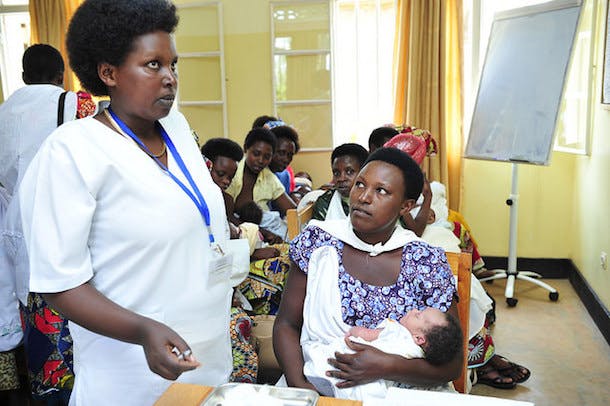
Although Zika rightly dominated many headlines related to global health in 2016, as we approach the end of the year, we would like to take a moment to reflect on some of the other major global health events and milestone throughout the year. It was a momentous year with many achievements and lessons learned, including:
Outbreaks and World Health Organization Health Emergencies Programme
Over the last few years, the world witnessed several major outbreaks, from the yellow fever outbreak in Angola and the Democratic Republic of the Congo to the largest Ebola outbreak in history in Liberia, Sierra Leone, and Guinea. The international community responded at an unprecedented scale to deploy health workers, coordinate efforts, and raise funds to fight the outbreaks.
Throughout the responses, many lessons were learned about the need to improve the capacity of organizations like the World Health Organization (WHO) to prevent, detect, and control outbreaks and support at-risk countries in building resilient public health systems. As a result, in early 2016, WHO committed to making changes and created the Health Emergencies Programme to expand and streamline the way WHO works in emergencies. With Dr. Peter Salama as the Executive Director, WHO’s Health Emergency Programme will coordinate resources and activities and help countries respond rapidly and effectively to health emergencies.
The Polio Vaccine Switch
Thanks to the Global Polio Eradication Initiative (GPEI), including the WHO, Rotary, UNICEF, the U.S Centers for Disease Control and Prevention, and the Bill & Melinda Gates Foundation, along with partners like the UN Foundation, national governments, and dedicated health workers, the world is closer than ever to eradicating polio with only three remaining polio-endemic countries (Afghanistan, Pakistan, and Nigeria).
In April 2016, GPEI and partners executed an unprecedented feat of switching 155 countries and territories from the trivalent oral polio vaccine (OPV), which contains all three strains of polio, to the bivalent OPV, which does not contain the type 2 polio strain (the type 2 strain was eradicated in 1999 and tends to cause 90% of the circulating vaccine-derived polio virus).
According to GPEI, “It was the largest and fastest globally coordinated rollout of a vaccine into routine immunization programs in history.” However, there is more work to do and we must remain diligent, especially considering the polio outbreak in Nigeria in July, which GPEI and partners responded to by launching a massive immunization operation to reach 40 million children in Nigeria and across the Lake Chad region.
5th Global Fund Replenishment
The Global Fund to Fight AIDS, Tuberculosis and Malaria is a partnership which has already saved more than 20 million lives. This year, during the Global Fund’s Fifth Replenishment Conference in September, donors made an extraordinary commitment toward ending the three deadliest epidemics of our lifetime by pledging nearly $13 billion to the Global Fund, which over the next three years, is expected to save up to 8 million lives, avert 300 million infections, and help build resilient and sustainable systems for health to ensure we don’t leave anyone behind. Help support the Global Fund by making a donation to the UN Foundation Fund for AIDS, Tuberculosis and Malaria, which can go directly to the Global Fund.
Measles and Rubella-free in Western Hemisphere
The Measles & Rubella Initiative (M&RI), of which the UN Foundation is a founding partner, has helped vaccinate over 2 billion children and prevent 17.1 million deaths since its inception in 2001. On September 27, 2016, the region of the Americas was declared the first in the world to have eliminated measles. This achievement is the culmination of a 22-year effort involving mass vaccination against measles, mumps, and rubella throughout the Americas, which M&RI helped support. Want to make a donation to help fight measles and rubella? You can donate directly to M&RI or donate to the Shot@Life campaign.
Antimicrobial Resistance
Antibiotic resistance (AMR) is one of the biggest and most challenging threats to global health today, especially since it is rising to dangerously high levels around the world with fewer treatment options available. Without global action, it is predicted that AMR will lead to 300 million premature deaths and up to $100 trillion lost to the global economy by 2050. In September 2016, during the UN High Level Meeting on Antimicrobial Resistance, Member States adopted a declaration on AMR to support the Global Action Plan on Antimicrobial Resistance and coordinate the fight against antimicrobial resistance across multiple sectors, especially human health, animal health, and agriculture.
Cholera in Haiti
Since cholera first surfaced in Haiti in 2010, an estimated 780,000 people have been infected with this disease and more than 9,000 people have died. While the Haitian government, United Nations agencies, and non-governmental organizations have worked hard to decrease cholera cases by 90% since 2010, Haiti still remains the home to the highest number of cholera cases in the world. The destruction and displacement caused by Hurricane Matthew in October has also tripled the number of people suspected with cholera. UN Secretary-General Ban-Ki Moon has expressed deep regrets for the loss of life and apologized to the Haitian people for the UN’s role (read his full remarks). The UN has committed to helping provide an estimated $400 million over the next two years to respond to and reduce the incidence of cholera in Haiti by training and mobilizing health workers, scaling up cholera vaccine campaigns, and addressing long-term issues such as sanitation and health systems strengthening. You can help by donating to the UN’s Haiti Cholera Respond Fund.



 View All Blog Posts
View All Blog Posts